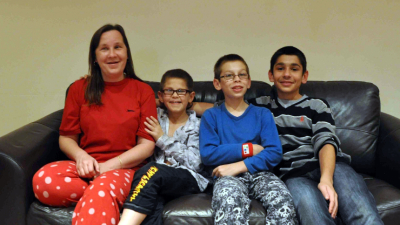Find out what it really means to miss out on what others take for granted and the deep impact this has on lives and opportunities. The PSE team have filmed with five families living in London, north-east England, Scotland and Northern Ireland. Between them, they represent each of the following key groups vulnerable to poverty:
- single parents on benefits
- the young unemployed
- low-paid workers supporting a family
- adults who are disabled
- single pensioners.
All lack a range of the necessities selected by the public as essential for a minimum living standard in the UK today (see the full list of child and adult necessities in explore the data). They are all also living on a low income. Using the consensual method for defining poverty that underpins the PSE: UK research, each household is living in poverty.
The following series of short films were recorded between late 2011 and early 2012. The PSE team is very grateful to all the families who are sharing their experiences with us.
Featured case studies
Renée is 40 and works long hours for low pay to try to provide for her four children, aged 3 to 14, and her 80-year-old mother.
Jennie is 39 and unemployed. She lives with her three sons, all of whom have disabilities, in Redbridge, outer London.
Marc is 19 and lives in Redcar in north-east England, a town where there are twelve times as many people claiming job seeker’s allowance as there a
Background
The burden of the downturn that followed the 2008 economic crash was borne by those on the lowest incomes (see Burden of economic downturn taken by the low paid). In addition, the Coalition government’s austerity measures and changes to the tax and benefit system will impact heavily on those on lowest incomes. The Institute for Fiscal Studies estimates that the net effect will be a rise in both child and adult poverty levels (see UK poverty set to rise in next three years). The government’s plans include cuts of £18 billion to the welfare budget between 2011 and 2014. While the introduction of Universal Credit should, in principle, increase the benefit entitlements of some households, these improvements are more than offset by other changes to personal taxes and state benefits, such as linking benefits to the Consumer Price Index rather than to the Retail Price Index (see Child and adult poverty set to rise by 2015). In addition, Universal Credit risks making certain groups significantly worse off, in particular single working mothers (see Welfare reforms could push 250,000 children deeper into poverty).





 PSE:UK is a major collaboration between the University of Bristol, Heriot-Watt University, The Open University, Queen's University Belfast, University of Glasgow and the University of York working with the National Centre for Social Research and the Northern Ireland Statistics and Research Agency. ESRC Grant RES-060-25-0052.
PSE:UK is a major collaboration between the University of Bristol, Heriot-Watt University, The Open University, Queen's University Belfast, University of Glasgow and the University of York working with the National Centre for Social Research and the Northern Ireland Statistics and Research Agency. ESRC Grant RES-060-25-0052.






